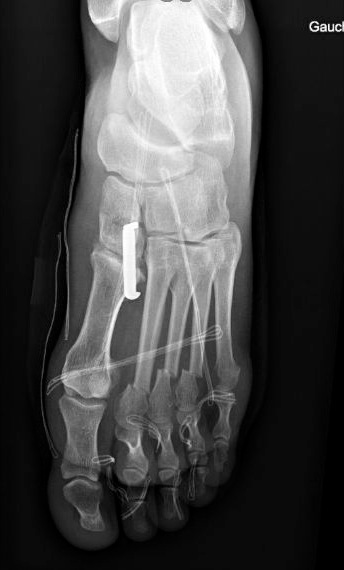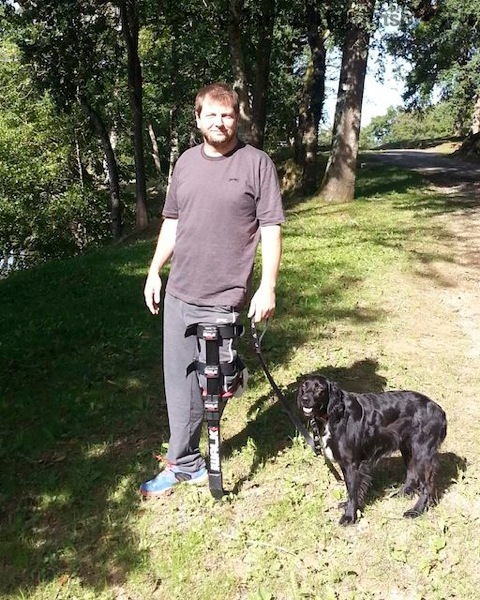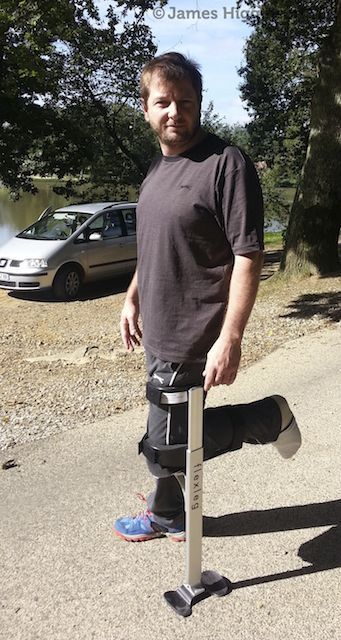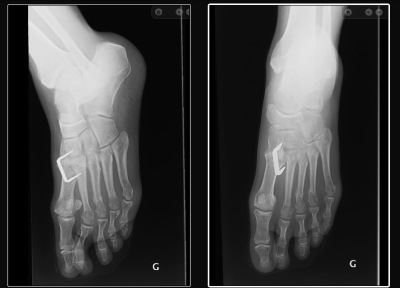It's mid October and I've been scratching around on crutches following surgery to correct a fallen arch in my foot. This was a planned operation and having seen Catharine try to operate under similar conditions when she broke her ankle sledding, I though I would get ahead of the situation and see what I could do to make things go a little more smoothly!
With this vague notion in mind, I took to Google using the search term 'crutch alternative', and lo and behold, such things do exist. They range from wheeled trollies and pirate style wooden legs to highly engineered temporary prosthetics. I went for the latter option, fired off a few emails to various suppliers of these modern day Blackbeard contraptions and before I could say, 'shiver me timbers', two of the market leading devices had turned up at my gang plank.
I'll give you a bit of background on the procedure itself before I go in to details about the products.
Over the last couple of years walking on my left foot has become increasingly uncomfortable to the point where on some days, I could feel the bones in my foot rubbing against each other. I've known something was wrong for a while; several years before the pain began, the second toe had begun to point more towards the big toe than go straight. At the time, it wasn't causing me much pain, so I didn't pay it much attention.

It was only when the pain increased in frequency and strength that I visited my French GP (médecin traitant) to see what could be done. This was the start of a long period of tests and treatments. At this stage the treatment offered was an orthopaedic insole with support and raised areas to keep the structure of the arch in place.
Initially the pain relief from wearing the insert was very noticeable; for the first time in a couple of years walking was comfortable. However, the benefit was short lived and within six months I was in pain again. My GP agreed that the situation was not improving. He sent me to see a specialist foot surgeon who in turn, sent me for another battery of tests which resulted in the custom manufacture of a second insole at the cost of a mere 300 euros.
As was the case with the first insole, the pain relief was short lived. By now I was in pain virtually all of the time, even when sitting down and I was soon back in my GP’s surgery looking for a second opinion and hopefully, a more permanent solution.

The second surgeon suggested a type of metatarsal osteotomy, a surgical procedure where the metatarsal bone (or bones in my case) are shortened. The operation took place at Bayonne hospital in the Basque Country in South West France on the 23rd of September and I am now at home recovering.
At this point, I’d like to introduce drum roll - my two ‘legs’ - the iWalkFree distributed by Peglegs UK and the FlexLeg from a US based company of the same name.
Both the iWalkFree and FlexLeg are available to buy outright or to rent from Peglegs uk and Flexleg respectively and are targeted at individuals who have sustained lower leg injuries.
Injuries of this kind are typically managed with the use of crutches or wheelchairs, but the big difference here, is that both of these devices allow suitable patients mobility whilst retaining the use of their hands.
Whilst that may sound obvious, it was only when I had no choice but to use crutches to move around, that I realised quite how restricting they are. For example, you can get to the fridge, but you have to stand there snacking away as you can’t carry anything away with you!
Having used the crutches for a couple of weeks now I can report that I have wrist and shoulder pain as a result. Both hands-free alternatives alleviate this strain by diverting a large proportion of the load to your knee; this is much more comfortable than standing or walking with crutches.

How do they differ? On initial inspection they appear to be quite similar, it’s essentially a single rigid post with a foot, a knee platform and some straps to attach it your leg. Both devices are made from a combination of aluminium and plastic/resin and as such are both lightweight at under 2.5 kg. There are, however, subtle differences. The iWalk’s main support is positioned centrally in front of the leg whereas the Flexleg is off to the side. I personally prefer the side mounted arrangement as it forces your weight back towards the other leg when walking.
The foot of the iWalk is a semi-sphere of rubber which allows for easy movement in all directions whereas the Flexleg has a double scoop arrangement which encourages forward movement. The other main difference is the way in which they are attached to your leg. Flexleg opt for simple velcro straps and iWalk have gone with a more secure ratchet system similar to what you might see on a ski boot. I’ve found both have their pros and cons; the ratchet system of the iWalk feels more secure and the tension can be easily increased. Equally it is quite awkward to get off in comparison to the velcro straps of the Flexleg. I don’t think either are perfect and they can both be quite uncomfortable after a period of time.
To summarise, both of these ‘hands free’ crutch alternatives do what they say on the tin. Without them there are many things I would be unable to do and I would highly recommend them to anyone in a similar situation. I wouldn’t say they replace the crutches as there are times when a quick trip to the sofa or dining table for example, do not require them, but they are definitely a valuable addition to your mobility arsenal!
At the time of writing the Flexleg was not available in Europe.
If you would like further information on either product you can contact the manufacturers directly
FlexLeg promotional video
IWalkFree promotional video
